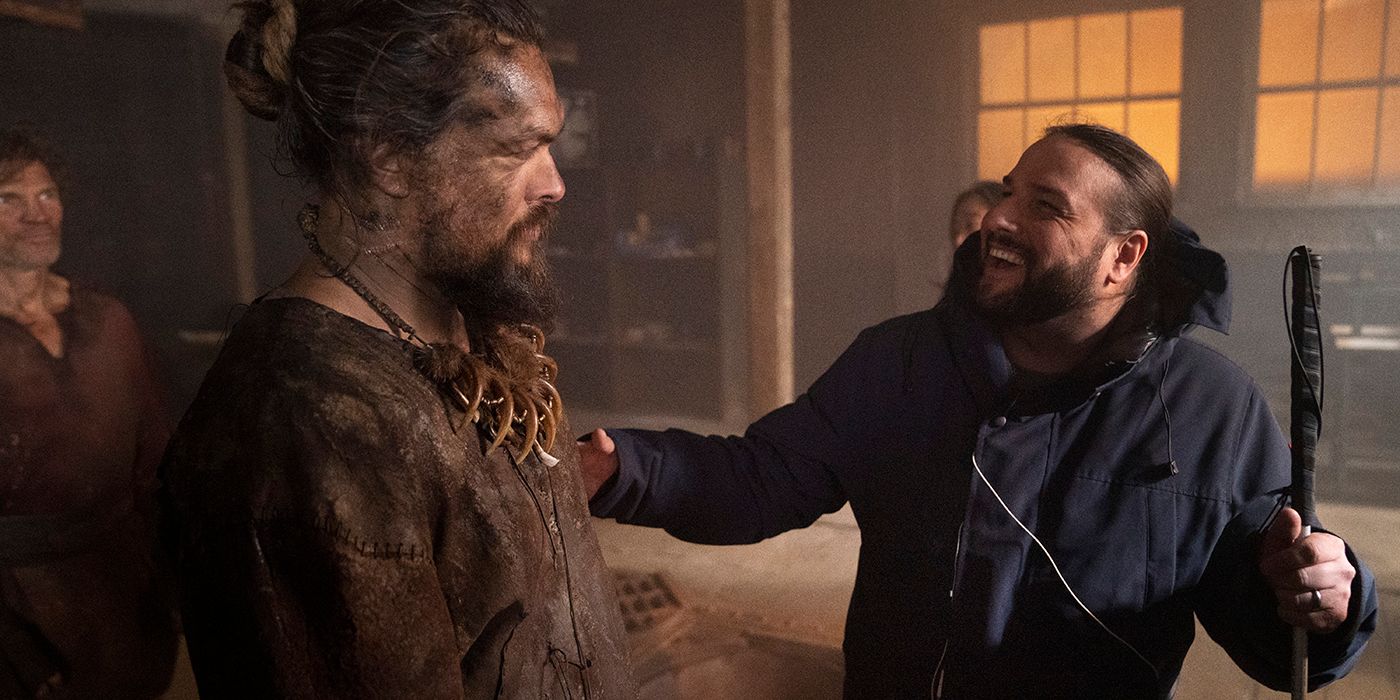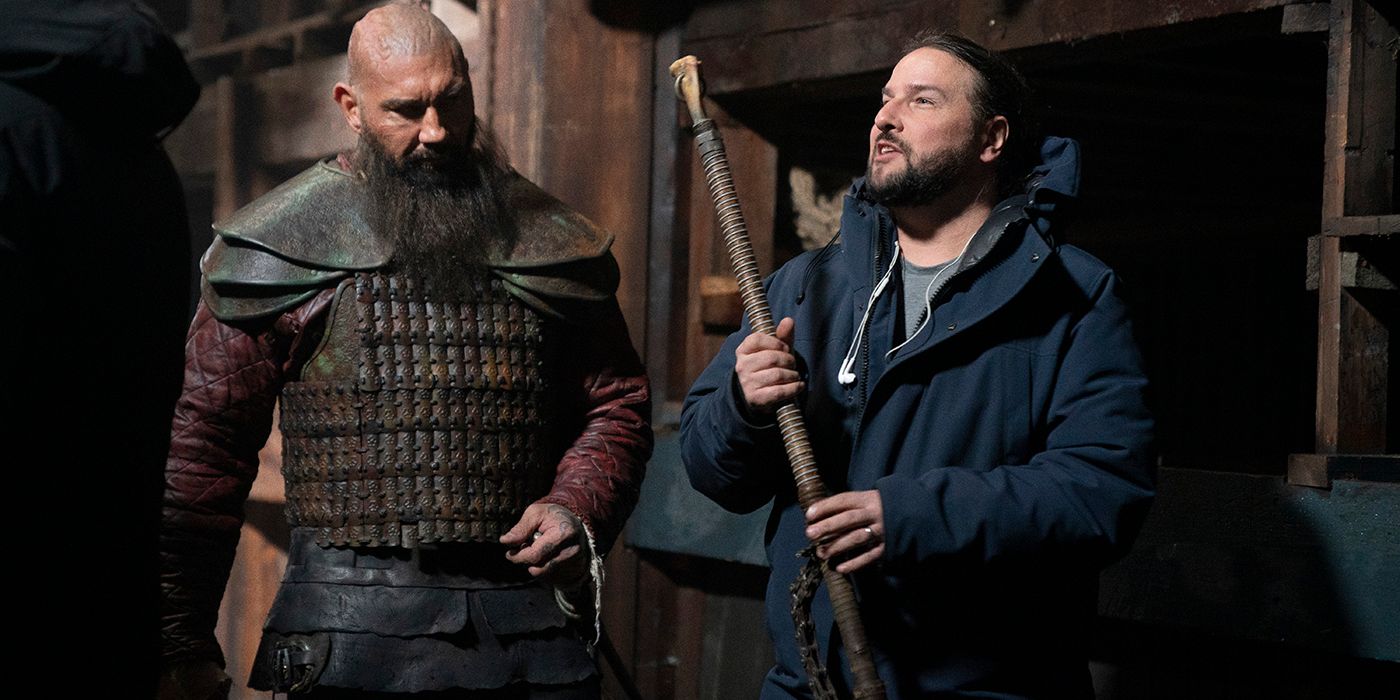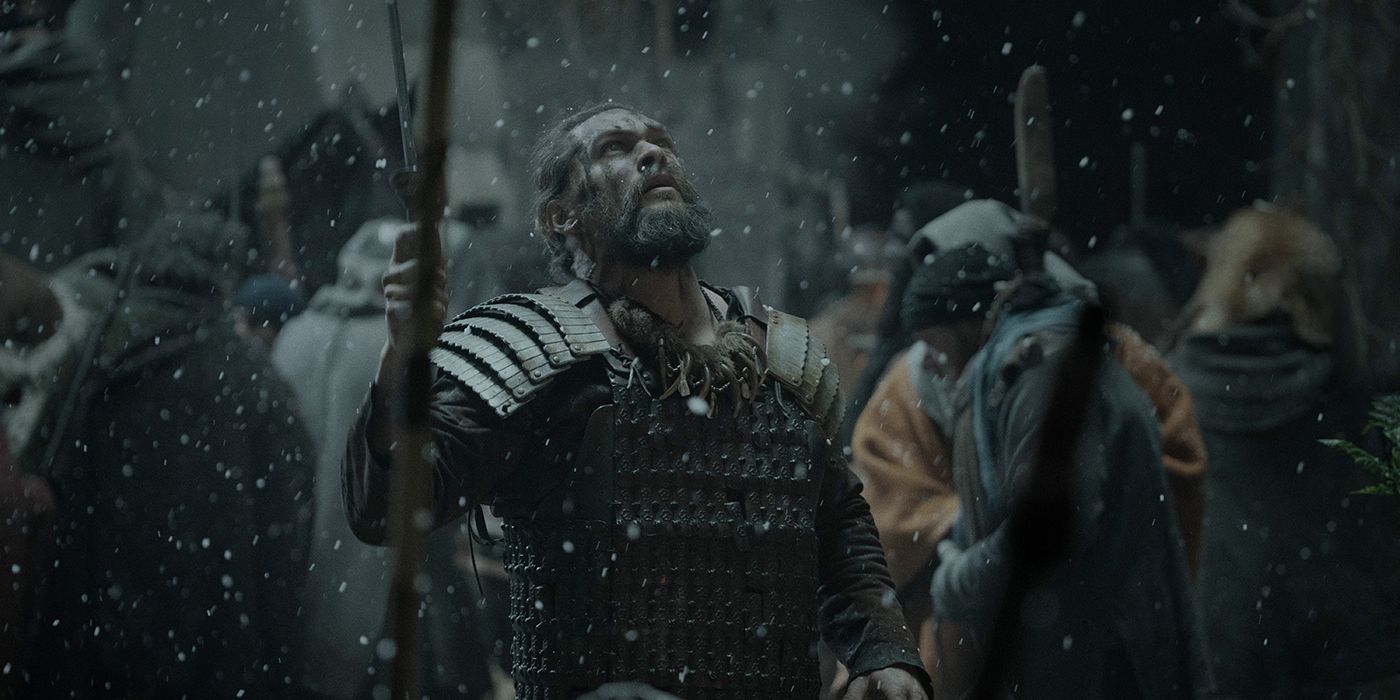See's second season has kicked off with a bang on Apple TV+, opening up new locations like the Trevantian empire and the new Payan capital of Pennsa. Those locations also beget new characters, such as Baba Voss' brother Edo (Dave Bautista, Guardians of The Galaxy) and his faction. Fans are already seeing how tensions rise as Baba (Jason Momoa, Aquaman) tries to reunite his family under intense pressure.
The epic series hired blindness consultant Joe Strechay (Daredevil and The OA) in its first season to acquaint the cast with the world of blindness and ensure low vision actors' needs are met. But as the world of See has expanded, so has his role, for there are always new characters to incorporate and new situations requiring an authentic approach.
Strechay spoke to Screen Rant about how he and his team work with the cast and crew alike to shape the universe of the story, and which aspects of season 2 he's most excited about.
Screen Rant: I know you previously worked on Daredevil and The OA, but I have to imagine See is the largest scale project you've done. How do you approach working with such a large cast in such an expansive way?
Joe Strechay: Yeah, it's exciting to get to work on a scale like Apple TV+'s See. Every cast member that comes through our show, I meet with and I work with, and I have a team of choreographers who have run into our world of See and helped design our rituals and culture.
But all of our crew and cast go through a beginning orientation around blindness, and the differences between the world of See and the current world of blindness.
In our world, people have been totally blind for generations and generations. So, eye contact - the social and cultural norm of eye contact - disappears after generations of blindness. We play with that, and we play with so many other things. Getting to design that and work with the actors to help develop out their characters around it with my choreographers and my team, and getting to work with all these other departments, is a true blessing.
This season, not only have new actors come in and new locations been introduced, but your role itself has expanded. What has that evolution of your work on See been like?
Joe Strechay: I'm a co-producer of season 2, and I'm over our movement and our blindness. I supervise a team of choreographers and help to develop the training that we use with all of our actors, whether they're actors with sight or actors who are blind or low-vision - because we have actors who are blind or low-vision on our show.
I also work with our art department, with our production designer, and with our props department to make sure that when we're building out, we're thinking about what this world of blindness would be. Everyone in our cast is so considerate, whether they're portraying blindness, whether they're actors who are blind or low vision, or they're just actors who are portraying a character with sight - they take so much care into developing their character, interacting in this world, and thinking of things that sometimes I miss. I feel lucky to work with them.
All the new actors have said so many great things about you. Has there been any moment this season that stood out most to you when it comes to teaching the cast or learning from them?
Joe Strechay: Yeah, there are lots of moments. Like the interactions with Dave Bautista as he was figuring out how his character was going to provide orders.
He wanted to do something different, so we thought about whether he could slap his wristband that has a piece of metal on it. And then he has a plate on his thigh so he can hit it and create some echolocation with it. He wanted to make sure he could use it for signaling, but he could also use it for echolocation. He could be providing orders with it or he could be trying to figure out that environment.
All of our actors want to have input about their props too, so it's exciting.
When you approach an actor or are figuring out certain movements, you obviously take into consideration whether they are low vision or not. Do you also look over the script to come up with a character background for them, or do they come in with most of their character work?
Joe Strechay: I think both. My whole team, we look at the script and create an action list for every character that's in our show. We go through and define what each character does.
But then we spend time with that actor, and they speak with our showrunner about the character and they spend time exploring. Then we make proposals and have suggestions, and they have their own proposals and suggestions, and we try to bring in things from that actor's real life and personality.
There'll be things that we can build into that character and into their movements, build into their posture and little habits, or idiosyncrasies. Like self-stimulation, when you maybe you shake your leg or rub your fingers together or touch your sleeve. We all do those things.
I love how many complex women See has, and I was wondering if there is a different approach to stunts for them in general. Do you start with the same base when dealing with Haniwa (Nesta Cooper), for example, or from a different place?
Joe Strechay: Each character is different. And whether they're male or female, I actually look even further than that. I look at each individual, and my interactions - whether with a character or with an actor - are different. I create a profile in my head of how I'm going to interact with these actors and how their process works. I ask them about their process and how they like their notes; how they like input and what their preparation is like.
And they all have a different process. So, I want to meet them where they are. I can't say enough about Nesta Cooper, Hera Hilmar, Sylvia Hoeks, and all the talented women that are on our show.
You mentioned Dave Bautista coming in and Baba Voss' family story opening up. Is there any one storyline that you're most excited for fans to enjoy or experience the evolution of?
Joe Strechay: I think one of the big themes in our show, whether it's stated or not, is ableism. And I think you're gonna see ableism from episode 1, with Baba Voss speaking to one of his children. I think you're gonna see characters who are blind being ableist towards characters with sight; I think you're gonna see ableism from characters with sight towards characters who are blind, and then characters who are blind towards other characters who are blind.
I know because I experienced that every day in my life. My showrunner, Jonathan Tropper, and I really wanted to build that into season 2. We wanted to try to address that in a creative way. Because every day when I go out, people try to decide what I can do and can't do as a person who's blind. And even people from my community have tried to decide what they think I should be doing or maybe [what] they don't think I can do.
It's been a long wait between seasons, primarily thanks to the pandemic. Would you say that the added time allowed for any conversations or considerations about how to approach the season?
Joe Strechay: Yeah, we've been very lucky and had to rethink how we were doing things. We brought in Anders Engström, who helped to film the majority of season 2. He and I were really close, and he helped to expand my role in season one during episodes 4 and 5.
We are helping to block every scene in our show and helping to create it, working with actors on making that world of See and really keeping that focus on what See is and what it isn't.
Have you felt that more doors are opening for the low-vision community on-screen since See? Have you gotten more requests or heard of more projects being developed with that consideration?
Joe Strechay: 100%. The doors are starting to open, and are being kicked down too, for actors who are blind or low-vision and persons with disabilities. I get contacted about shows trying to cast people who are blind or low vision.
For every part, the showrunner and I review all the auditions for our show. He and I make the decision on every cast member that comes to See. We review, so I get to see all these actors who are blind or low vision putting themselves out there. So when shows come they and ask, I make recommendations and give references to people.
We had nine actors who are blind or low vision in season 2, and three are in recurring roles. One of them was a day player; she was on one day and ended up landing a principal role in a film. There were many others who have moved on to other opportunities - not just in that aspect, but in other aspects. People from season 1 went on to other shows, so we've been very lucky. We're hoping to open doors, but also to help advise on how to bring people on.
I hope See goes on for many more seasons. But is there another genre that you want to work with, or do you like action-oriented stories that involve stunts more?
Joe Strechay: I love drama, for sure. Drama is my favorite - anything with dialogue, pretty much, I love. I get offers on opportunities all the time, but I'm usually hesitant about comedies. I'm a fan of comedies, but I don't typically want to work on one. So dramas, for sure, and anything with some action in it. But I love good dialogue.
New episodes of See season 2 premiere on Apple TV+ every Friday.



